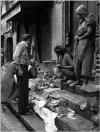Abstract
The practices of urban heritage conservation which focus primarly in the beautification of a neighborhood can promote a modificationin the social and economic local structures. In this case, the loss of social diversity and the specialization of the localeconomy can transform the neighborhood into an “exclusive” place which serves only to one group: the tourists. To combat thistendency to produce city-museums from the traditional neighborhoods, it is necessary to identify those tangible and intangibleelements that contribute to maintain the physical structure as well as the different social categories of residents and theireveryday practices related to space. When trading in the streets serves mainly to residents and it participates to widen therange of products and diversify the forms of vending, its conservation as part of the urban space can contribute to maintainthe qualities of a neighborhood as a place “for all”.Apuntes is registered under a Creative Commons Attribution 4.0 International Public License. Thus, this work may be reproduced, distributed, and publicly shared in digital format, as long as the names of the authors and Pontificia Universidad Javeriana are acknowledged. Others are allowed to quote, adapt, transform, auto-archive, republish, and create based on this material, for any purpose (even commercial ones), provided the authorship is duly acknowledged, a link to the original work is provided, and it is specified if changes have been made. Pontificia Universidad Javeriana does not hold the rights of published works and the authors are solely responsible for the contents of their works; they keep the moral, intellectual, privacy, and publicity rights.
Approving the intervention of the work (review, copy-editing, translation, layout) and the following outreach, are granted through an use license and not through an assignment of rights. This means the journal and Pontificia Universidad Javeriana cannot be held responsible for any ethical malpractice by the authors. As a consequence of the protection granted by the use license, the journal is not required to publish recantations or modify information already published, unless the errata stems from the editorial management process. Publishing contents in this journal does not generate royalties for contributors.

